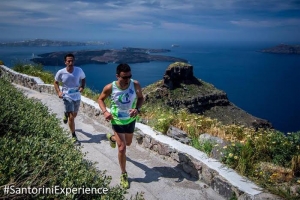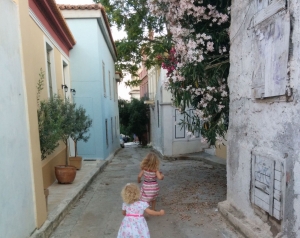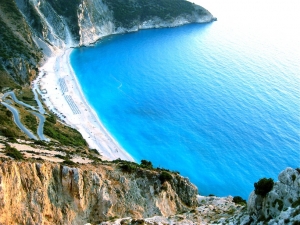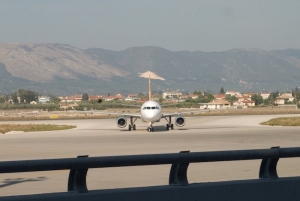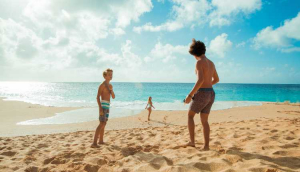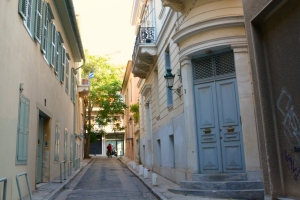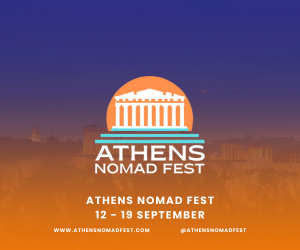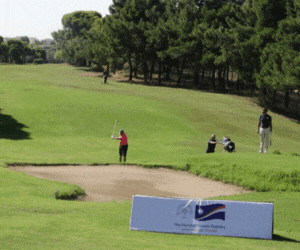LIFE & CULTURE
XpatAthens
Tuesday, 21 June 2016 07:00
Registration Is Open For Santorini Experience 2016
Registrations are open for Santorini Experience 2016!
Privileged accommodation packages during the days of the event!
The exquisite event 'Santorini Experience' is ready to welcome the lovers of swimming and running on October 7-9, 2016!
On Saturday, October 8th, 2016, runners of all abilities will have the opportunity to run at the exceptional routes of 5km (running and dynamic walking), 10 km and 15 km (total positive altitude: 834 m.) overlooking the unique images of the volcano, the Caldera and the sites Imerovigli, Firostefani and Oia. The routes have been designed and edited this year by the former marathon runner, holder of national best performance on the classical route, running coach and director of All About Running, Nikos Polias. The starting time of the 10 km and 15 km routes is common at 08:15 am (with a limit of 150 participants per route), while the starting time of the 5km route will take place at 11:00 (with a limit of 200 participants). All routes start from the desalination plant in Oia with an initial direction towards Fira and athletes return back at 2.5 km, 5 km and 7.5 km points respectively, to finish their running at the same point where they started.
Runners will discover the magical trail that connects Oia with Fira overlooking the Caldera of Santorini (Thira), which took its name from Thira, the first Spartan colonist of the island. A detailed description of the routes including maps and technical details (altitude) is available in the following link: http://santorini-experience.com/event_routes_16_en.html It must also be noted that with the suggestion of the technical director of running, three vertical running routes will be prepared this year to enrich the weekend schedule of the event.
Ancient Santorini (Thira) was an earthly paradise, destroyed in 1,500 BC, along with a multitude of nearby coasts, dragging brilliant samples of the Aegean civilization. Its description fits perfectly with what Plato was saying for the mythical land of the Atlases that was completely destroyed, leaving no trace behind. The Atlantis.
So over the sunken Atlantis participants in the sport of swimming will have the opportunity to swim in the unique swimming route of 1.5 mile (2.4 km) of “Santorini Experience”, on Sunday, October 9, 2016 at 10:00 am, from the volcano to the old port in Fira.
The route has been designed by the Federal Technical Coach of Swimming, with Olympic and World distinctions in open water swimming and Technical Director of the event in swimming, Nikos Gemelos. The event will also be held under the auspices of the Hellenic Swimming Federation (KOE), something that happens for the first time in open water swimming, at a sports tourism event, marking the explosive participation expected from swimmers and swimming clubs from all over Greece and abroad.
Those interested can now make their registration in swimming or running through the official page of the event in the following link: http://activemedia.com.gr/product/santorini-experience-2/
For those wishing to combine sports with tourism and take advantage of their stay in one of the two or three most beautiful islands in the world, if not the most beautiful, privileged packages starting from 300 euro for 2 people for 3 days - 2 nights (including transportation, accommodation, food and participation in the event) will be available. For more information you may contact the hospitality sponsors of the event: Santorini Hoteliers Association, Meltemi Hotels & Resorts, Athina Luxury Suites, Central Fira Hotel, Sienna Residencies, Memories Hotel and Loizos Stylish Residencies which are available in the following link: http://santorini-experience.com/event_accommodation_en.html. The page will be daily enriched with new supporters and in the upcoming days discounts on transportation to Santorini will be announced.
This year's event will have an unprecedented international promotion, as FOX Sports of FOX Networks Group, will carry forward as the Official Broadcaster of “Santorini Experience” its sports documentary, to millions of homes in Europe, Asia and Africa, creating a unique television product.
'Santorini Experience' is collaboration between the Municipality of Santorini, the Municipal Sports Cultural Environmental Organization of Santorini (D.A.P.P.O.S.) and Active Media Group.
Sponsors: Alafouzos Sport, Santorini Boatmen Union
Supporter: Village Cinemas Official Broadcaster: FOX Sports
Hospitality Sponsors: Santorini Hoteliers Association, Meltemi Hotels & Resorts, Athina Luxury Suites, Central Fira Hotel, Sienna Residencies, Memories Hotel, Loizos Stylish Residencies
Under the auspices of the Hellenic Swimming Federation (K.O.E.)
Website
Facebook
Twitter
Youtube Channel
Instagram
Google+
The exquisite event 'Santorini Experience' is ready to welcome the lovers of swimming and running on October 7-9, 2016!
On Saturday, October 8th, 2016, runners of all abilities will have the opportunity to run at the exceptional routes of 5km (running and dynamic walking), 10 km and 15 km (total positive altitude: 834 m.) overlooking the unique images of the volcano, the Caldera and the sites Imerovigli, Firostefani and Oia. The routes have been designed and edited this year by the former marathon runner, holder of national best performance on the classical route, running coach and director of All About Running, Nikos Polias. The starting time of the 10 km and 15 km routes is common at 08:15 am (with a limit of 150 participants per route), while the starting time of the 5km route will take place at 11:00 (with a limit of 200 participants). All routes start from the desalination plant in Oia with an initial direction towards Fira and athletes return back at 2.5 km, 5 km and 7.5 km points respectively, to finish their running at the same point where they started.
Runners will discover the magical trail that connects Oia with Fira overlooking the Caldera of Santorini (Thira), which took its name from Thira, the first Spartan colonist of the island. A detailed description of the routes including maps and technical details (altitude) is available in the following link: http://santorini-experience.com/event_routes_16_en.html It must also be noted that with the suggestion of the technical director of running, three vertical running routes will be prepared this year to enrich the weekend schedule of the event.
Ancient Santorini (Thira) was an earthly paradise, destroyed in 1,500 BC, along with a multitude of nearby coasts, dragging brilliant samples of the Aegean civilization. Its description fits perfectly with what Plato was saying for the mythical land of the Atlases that was completely destroyed, leaving no trace behind. The Atlantis.
So over the sunken Atlantis participants in the sport of swimming will have the opportunity to swim in the unique swimming route of 1.5 mile (2.4 km) of “Santorini Experience”, on Sunday, October 9, 2016 at 10:00 am, from the volcano to the old port in Fira.
The route has been designed by the Federal Technical Coach of Swimming, with Olympic and World distinctions in open water swimming and Technical Director of the event in swimming, Nikos Gemelos. The event will also be held under the auspices of the Hellenic Swimming Federation (KOE), something that happens for the first time in open water swimming, at a sports tourism event, marking the explosive participation expected from swimmers and swimming clubs from all over Greece and abroad.
Those interested can now make their registration in swimming or running through the official page of the event in the following link: http://activemedia.com.gr/product/santorini-experience-2/
For those wishing to combine sports with tourism and take advantage of their stay in one of the two or three most beautiful islands in the world, if not the most beautiful, privileged packages starting from 300 euro for 2 people for 3 days - 2 nights (including transportation, accommodation, food and participation in the event) will be available. For more information you may contact the hospitality sponsors of the event: Santorini Hoteliers Association, Meltemi Hotels & Resorts, Athina Luxury Suites, Central Fira Hotel, Sienna Residencies, Memories Hotel and Loizos Stylish Residencies which are available in the following link: http://santorini-experience.com/event_accommodation_en.html. The page will be daily enriched with new supporters and in the upcoming days discounts on transportation to Santorini will be announced.
This year's event will have an unprecedented international promotion, as FOX Sports of FOX Networks Group, will carry forward as the Official Broadcaster of “Santorini Experience” its sports documentary, to millions of homes in Europe, Asia and Africa, creating a unique television product.
'Santorini Experience' is collaboration between the Municipality of Santorini, the Municipal Sports Cultural Environmental Organization of Santorini (D.A.P.P.O.S.) and Active Media Group.
Sponsors: Alafouzos Sport, Santorini Boatmen Union
Supporter: Village Cinemas Official Broadcaster: FOX Sports
Hospitality Sponsors: Santorini Hoteliers Association, Meltemi Hotels & Resorts, Athina Luxury Suites, Central Fira Hotel, Sienna Residencies, Memories Hotel, Loizos Stylish Residencies
Under the auspices of the Hellenic Swimming Federation (K.O.E.)
Website
Youtube Channel
Google+
Published in
Local News
Tagged under
Thursday, 30 June 2016 09:32
Railway Carriage Theater To Treno Sto Rouf
One of the most well-hidden secrets of Athens, the unique Railway Carriage Theater to Treno sto Rouf, is an innovative, boutique, railway cultural venue, inside vintage train wagons. Heralded by 19th century science fiction novelist, Jules Vernes, it was realized in 1997 by the actress and director Tatiana Ligari to host the only train-theater in the world.
The Railway Carriage Theater to Treno sto Rouf consists of nine refurbished antique cars, including an original wagon-restaurant from the 1926 Simplon Orient Express and a refurbished Breda type steam engine, which dates back to 1953, constituting evidence to modern Greek history and industrial heritage. All nine cars have been subsequently transformed, repaired and refurbished accordingly, with great sensitivity to originality and aesthetics, and are now home to a theatre stage, a music stage, a restaurant, a bar and foyer, dressing rooms and utility rooms. Every spring and summer there are tables set out on the station platform, where you can claim a spot in the cool breeze of the open-air bar-restaurant “Apovathra”.
For 22 consecutive years, the venue program mainly consists of artistic productions (theater, music, dance, visual arts, guided tours, educational programs, festivals, art projects, exhibitions, screenings, lectures etc.) equally paired with dining (be it romantic private parties, themed evenings or corporate events), while our bar and restaurant are open to all visiting guests.
Published in
City Venues
Tagged under
Monday, 03 July 2017 07:00
Tips For Visiting Athens During The Summer
Celeste, from Family Goes Out, gives her best advice for families visiting Athens during the warmer months. It's best to visit visit in May and June or September and October, where the temperatures are cooler and child-friendlier, but if you must visit during the peak of the summer, August is a good time to visit Athens, as the city empties when the Greeks go on holiday.
Tips for Visiting Athens on Hot Summer Days:
Babies and young children can get ill during hot weather (dehydration, heat stroke, sunburn). Babies less than 6 month old should be kept out of the sun. Always bring a light sheet, umbrella/cover for your stroller. Young infants cannot be in the sun during the hottest hours of the day. Sun hats with a wide brim and protective flap on the back, protective clothing and sunscreen are a must. Make sure your children drink plenty of water.
For July and August, make sure that you book your (air conditioned) accommodation (and everything else such as ferry boat / air tickets, etc.) well in advance. Choose one of the city hotels with a swimming pool. Another great option is to stay at the Athenian Coast, also known as the Athens riviera. There are several family friendly beach hotels and resorts here and it is very easy to get to the city from here by either car or public transport.
Athens is very hot during the day time so plan your activities in the mornings and afternoons/evenings. Do as the Greeks do and have a nap together with your children during the hottest hours of the day. You can also take a dip in your city hotel swimming pool (make sure the children stay in the shade) to cool off.
Visit the archeological sites only in the early morning, they open at 08:00.
To get around the city, instead of walking use the Athens Metro system.
A great idea for seeing all the highlights of the city is to use one of the so called hop-on-hop-off busses. There are several companies in Athens that offer such tours. These busses are air-conditioned and stroller friendly. Some of these bus tours combine their tickets with the tourist train in the historic center called Athens Happy Train or Sunshine express. This is another great way to get around the Plaka area with your kids whilst sitting in the shade and enjoying the sites. I would recommend the train for the afternoons.
Cool Places to Visit With Your Family During the Day:
- The National Gardens
- The New Acropolis Museum
- Hellenic Motor Museum
- The Athens War Museum
- The Museum of Greek Children’s Art
- Museum of the Ancient Agora
To read this article in full, please visit: Family Goes Out
Published in
Kids Life
Tagged under
Thursday, 30 June 2016 07:00
Schooling Plans For Refugee Children In Greece
In an effort to help refugee children in Greece complete their education, the Greek Ministry of Education and UNICEF have teamed up to devise short-term and long-term plans to fulfill this goal.
UNICEF’s Regional Director for Central and Eastern Europe, Marie-Pierre Poirier, visited Athens and Lesvos recently with the aim to collaborate with Greek authorities. While meeting with Greek education officials, she was informed about the current situation and the effects on refugee children.
According to UNICEF’s data, around 22,000 children are among the 55,000 migrants and refugees stranded in Greece. After interviewing 75% of school aged refugee children, 1 in 5 had never even begun their education. As a jumpstart, Greece’s Education Ministry has initiated pilot education and activities for children at refugee camps over the summer with the aim of beginning proper classes in the fall in their native language, English, and basic Greek.
While in Athens and Lesvos, Ms Poirier presented two plans to address the educational needs of the children. The first plan is a programme developed for younger children, which will allow for the immediate intervention at reception centers and the second plan is a programme to address the needs of adolescents, which include both education and career orientation.
For the younger children, the goal is to learn their mother tongue and English so they will be prepared once they settle in a host country. The goal for school aged children is to place them in Greek schools.
Apart from the educational needs Poirier was informed about, there are children who are unaccompanied. These children need to be aided by Greek institutions, prosecutors, and social workers to place them in foster care and eventually unite them with their families. UNICEF is also collaborating with the Migration Policy Ministry and the Social Solidarity Ministry to provide protection for unaccompanied minors.
To read this article in full, please visit: Greek News Agenda
To read this article in full, please visit: Greek News Agenda
Published in
Greece In The News
Tagged under
Monday, 19 September 2022 07:00
Latest News On Strikes In Athens
Workers at all means of public transport in Athens have announced their participation in the 24-hour general strike on Wednesday, September 21, 2022.
The strike will affect:
Athens Metro Lines 2 & 3, Urban Train ISAP (Metro Line 1), tram, blue buses and trolley buses!
*LATEST UPDATE: September 20, 2022
For information on how to contact an airline not listed below, click HERE.
AEGEAN AIR:
Customers are kindly advised to check the latest flight details by calling:
From Greece 0801 11 20000
From abroad or mobile + 30 210 6261000 or click HERE.
OLYMPIC AIR:
Olympic Air will attempt to contact with passengers on flights affected to forward them to other flights as well as network and informing them about changes in departure times.
For more information please contact the customer service at: 801 801 0101 (fixed) and 210 3550500 (mobile phones) or click HERE.
Published in
Local News
Tagged under
Tuesday, 28 June 2016 07:00
Best Beaches In Greece
There are over 2,000 islands in Greece and 16,000 km worth of coastline. The country is famous for its diversity, sandy beaches, pebbly shores, caves, and crystal waters so it can be hard to find where the best beaches are in Greece. Here are just a few:
Kephalonia - Ionian Islands
The popular beaches of Myrtos has white sand and rock, and excellent views of the cliffside village of Ano Mera. There are also caves with stalactites and stalagmites and one that is over 3km long.
The popular beaches of Myrtos has white sand and rock, and excellent views of the cliffside village of Ano Mera. There are also caves with stalactites and stalagmites and one that is over 3km long.
Lefkada - Ionian Islands
Lefkada is mainly a mountainous island with natural beauty, plane trees, historical and archaeological sites, and beautiful islets opposite the port of Nydri. These islets of Skorpios, Madouri, and Meganissi have plenty of caves to explore, including one that is known to have concealed a submarine during World War II.
The popular beaches are Porto Katsiki with white sand and turquoise waters and Egremnous, where the sea is perfect, but harder to get to.
Mykonos - Cycladic Islands
This island is known for its world-class beaches, becoming packed in July and August. Most of the beaches are on the south coast, which is protected from the northern winds.
Skiathos - Sporades
This island is not short of beaches with 62 exceptional ones to choose from. The organized beaches are on the south side and the quiet, untouched beaches are on the north side. Koukounaries and Lalaria are the two most popular beaches - Lalaria can only be accessed by boat.
To read this article in full, please visit: Hip Greece
Published in
Travel Greece
Tagged under
Tuesday, 28 June 2016 07:00
Six Regional Airports In Greece Receive Funding For Upgrades
The Greek Infrastructure, Transport, and Networks Ministry has announced that six regional airports in Greece will receive 197 million euros in EU funding towards their upgrade.
With the goal of boosting EU growth, the European Commission President started the Juncker Plan in 2014 and has since given the airports of Kastoria, Milos, Syros, Naxos, Paros, and Chios funds for modernization and development.
Part of the funds will come from Public Private Partnership and will focus on the design, construction, financing, and management of the airports. Under the supervision of the Civil Aviation Authority, the investors will have the right to use and manage airport facilities.
To read this article in full, please visit: Greek Travel Pages
To read this article in full, please visit: Greek Travel Pages
Published in
Greece In The News
Tagged under
Monday, 15 July 2024 07:00
3 Great Summers Bars In Athens
Summer has come and Athens is brimming with bars ideal for night (and day) crawlers! There is an abundance of bars that have various cocktails to choose from, sophisticated spirits that offer breaths of coolness, and super views of the acropolis.
If you feel a little spoiled for choice and don't know where to start from, here are 3 of our favorite summer bars!
The Zillers
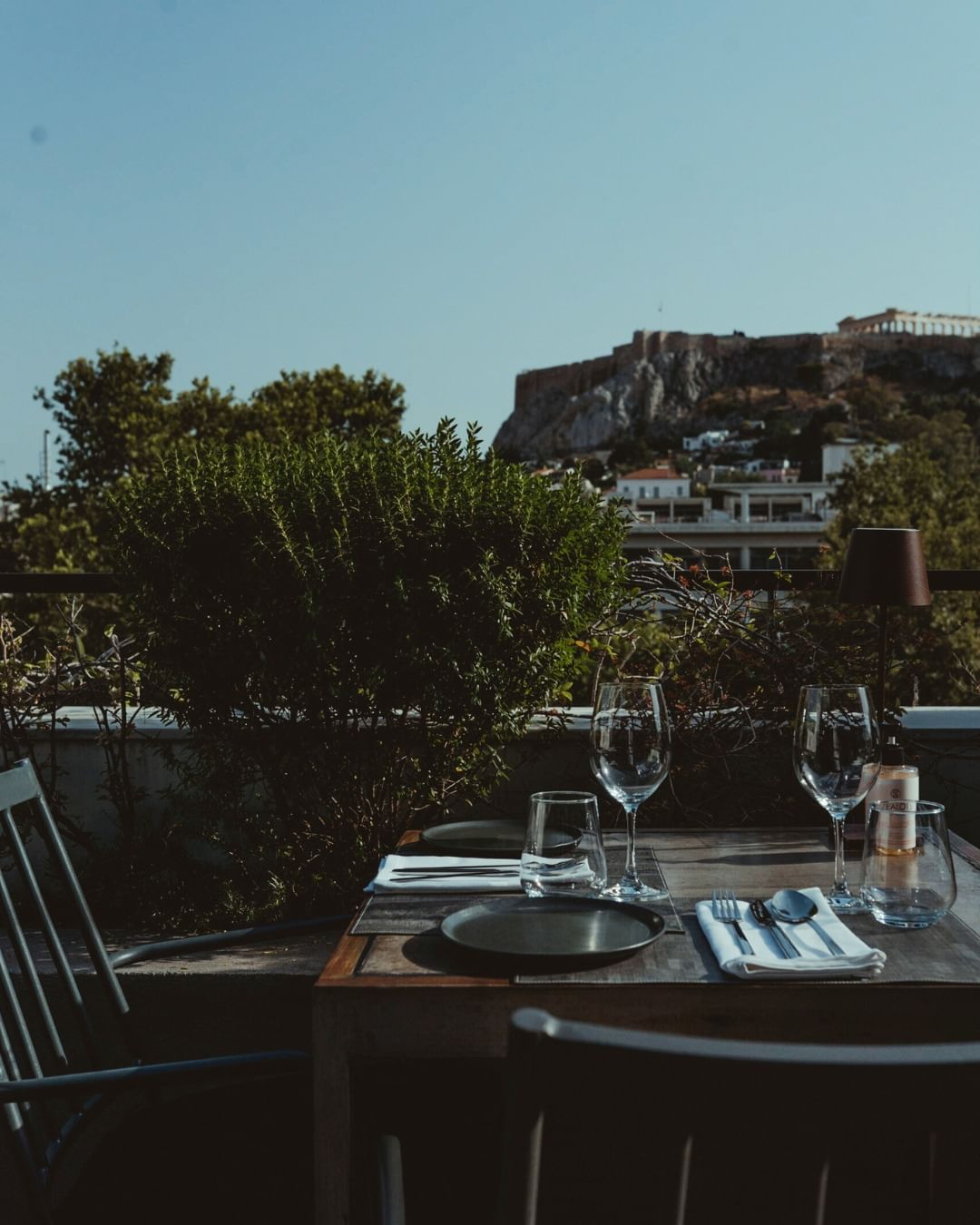
@thezillersathens

@thezillersathens
The Zillers, a restaurant and bar, is located on the top level of a hotel and is a popular hotspot in the city. Visitors will enjoy an excellent view of the Acropolis and of Mitropoleos square. What else could you ask from an open-air space for your summer nights? Cocktails of course! You may try the Ipanem cocktail with cachaca, passion fruit, lime, honey, and candy.
Where: Mitropoleos 54, Centre of Athens
Telephone: 210 322 2277
Telephone: 210 322 2277
Odori Vermuteria Di Atene
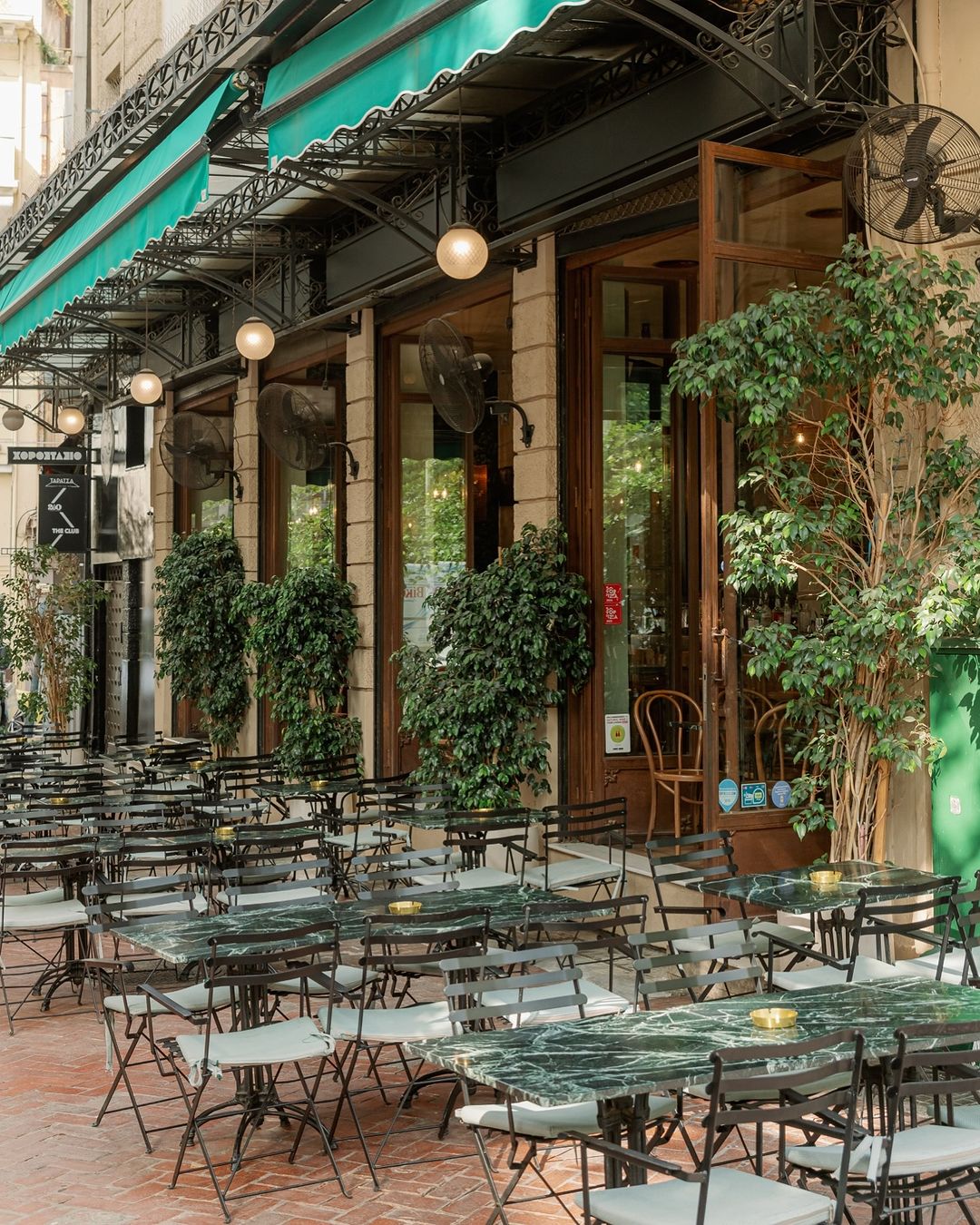
@odori_vermuteria

@odori_vermuteria
The first Greek Vermouteria borrows its name from the smells and aromatic herbs used in cooking. Inside the Odori, you can find a drinks list that is more than generous. Not limited to classic cocktails, but "playing" different vermouth and selected Greek spirits to enjoy your drink in your own measures. There are 8 signature options based on an equal number of herbs that flavor vermouth and they say it's exactly what you need. The interior is reminiscent of the botanical garden and the tables that lead to Skouleniou street are more than suitable for after-office drinks and an evening spirit.
Where: Skouleniou 2, Athens
Telephone: 210 3314674
Where: Skouleniou 2, Athens
Telephone: 210 3314674
Peace Of Mind
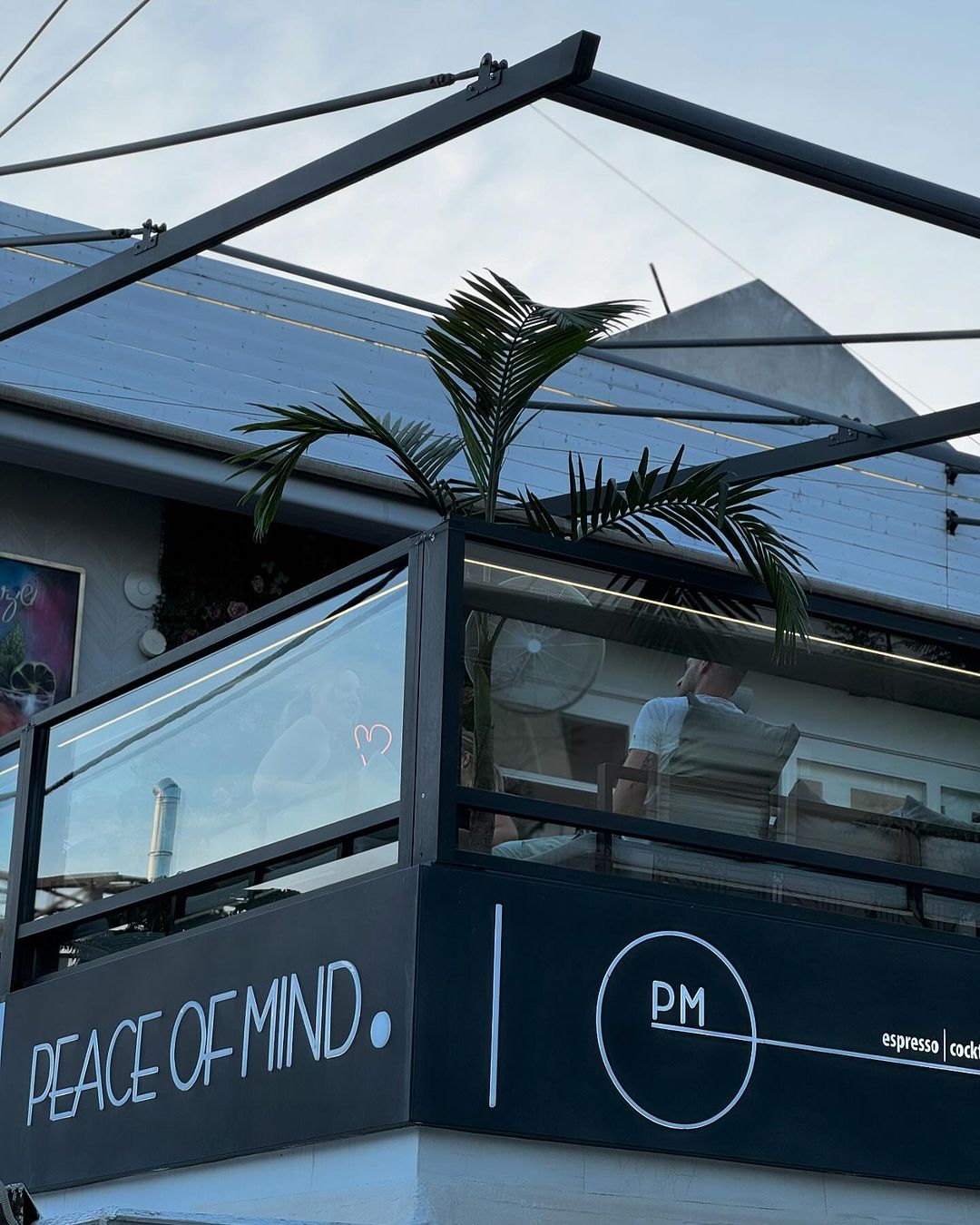
@peaceofmind.athens

@peaceofmind.athens
From the center, we move on to Hymettous where something exciting awaits. Is it the freshly roasted coffee? Is it the refreshing cocktails and the tables outside? It is and it's all together in this hip espresso & cocktail bar which promises 'peace of mind,' but also countless summer nights (and days) on the comfortable terrace and the accompaniment of fine foreign musicians. Visitors must try their fresh homemade Sangria and Spicy Mule, with homemade syrup chili, pineapple, slices of cucumber, and spicy cayenne pepper grains.
Where: Plateia Ymittou 3, Hymmetus
Telephone: 210 762 1880
Published in
Pubs, Bars & Cafes
Tagged under
Friday, 30 July 2021 07:00
Best Sandy Beaches Around Athens
The Athenian Riviera is lined with countless beautiful, clean beaches to choose from. However, if you are fixed on sandy beaches, you should definitely visit one of the beaches listed below!
Mauro Lithari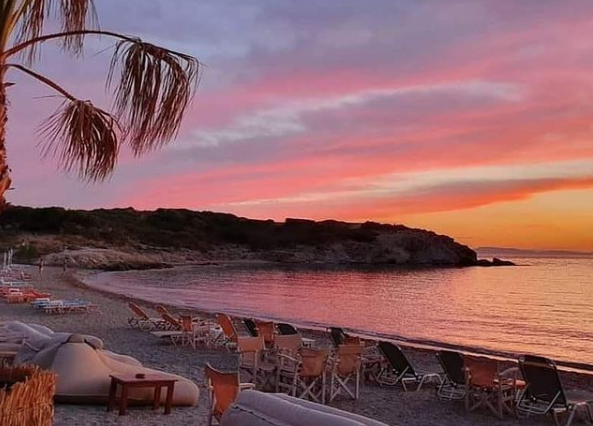
@mavro_lithari_beach_bar
Located relatively close to Athens (about 39 km), Mavro Lithari is a small but sandy, organized beach. It beach bars with ice-cold drinks appropriate when the heatwaves strike. The refreshments and drinks served at the beach bar will come in handy when the temperatures rise.
Kakia Thalassa
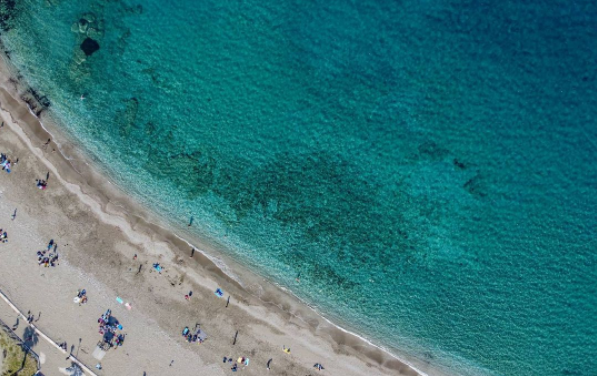

@drone_arcade
Kakia Thalassa is one of the cleanest beaches in Attica (except during northern winds). This beach is paved with small pebbles outside and sand in the water, it is relatively organized with sun loungers, umbrellas, and swings for kids. It is about an hour's drive from the center of Athens.
Loubarda
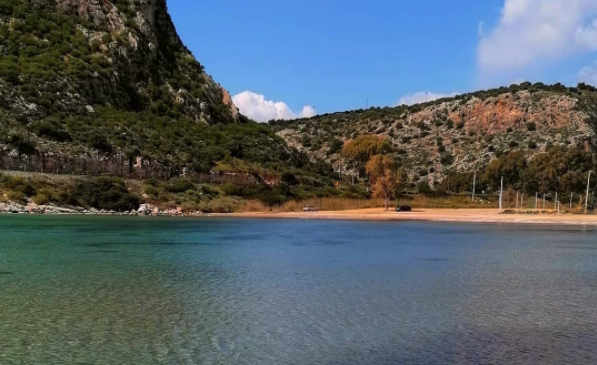

@karpdimitris
Located in Agia Marina Bay, Loubarda is organized and has shallow turquoise waters. The beach offers shelter from the wind due to its unique location.
Saronida
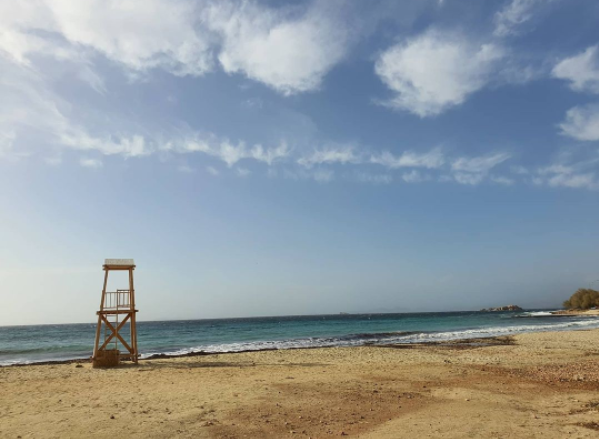
@scarlet_starlet_mary

@scarlet_starlet_mary
Saronida beach provides plenty of shade, but only if you get there in time to catch a spot to place your towel under the trees. It is sandy and has beautiful clear waters. It may not be organized, but you will find a kiosk and restaurants right across the road.
Grand Beach Lagonissi
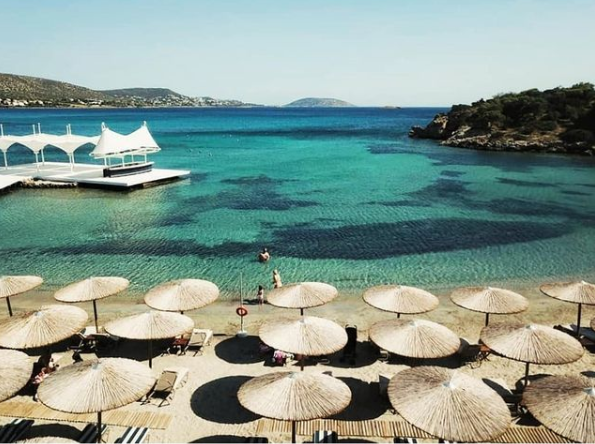
@grandbeachlagonissi

@grandbeachlagonissi
Undoubtedly one of the most beautiful and luxurious sandy beaches in Attica. It has beautiful waters and sand inside and out. A set with an umbrella & 2 sunbeds for a maximum of 2 persons costs € 30.00 from Monday to Friday. A set with an umbrella & 2 sunbeds for a maximum of 2 persons costs € 60.00 on Weekends and Holidays. Special rates apply for children aged 2-12.
Published in
City Discovery
Tagged under
Monday, 27 June 2016 07:00
Discover Athens Architecture - Ancient To Modern
Author and blogger Marissa Tejada recently went on a different kind of tour of Athens. Together with a local architect, she explored the city and listened to the stories behind each of the buildings. Here she tells us about her experience of the complex mix of ancient, historic, and new architecture of the city of Athens.
One thing I love about traveling in Europe is the amazing architecture that can be admired in the old towns. It’s wonderful to take in everything from fantastic castles, gorgeous sky high churches with spires and Gothic accents, to the charm of buildings and homes that have lined cobbled lanes before industrial modern times. For an American like me, it is all very fairy tale at times and simply charming.
It has been said that the landscape of Athens is an architectural challenge. Unregulated city growth and planning led to cookie-cutter housing, a lack of green space and grand centuries’ old buildings falling to the developer’s wrecking ball. Once elegant homes remain simply abandoned.
I have been walking the city center streets, where I live, for years now and failed to really look closer, only admiring the obvious: the Acropolis and other ancient structures that have survived with grace and the most important neoclassical buildings. However, I always kind of shook my head at buildings that lined the oldest Athenian neighborhoods which were a big old unnecessary hodgepodge of styles (some just ugly), at least to me.
Athens is a city built over a city, many times over. The ancient Greek world has been buried over time. Fast forward to today, within the past decades even, engineers and architects continue to literally bump into a landscape of antiquities.
Exploring much of Greece, you’ll find this kind of construction where eras are built over eras. Another reason why you can say Athens is truly a fascinating city of layers.
To read Marissa's article in full, please visit: My Greece My Travels
To read Marissa's article in full, please visit: My Greece My Travels
Published in
City Discovery
Tagged under


